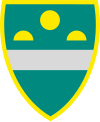Murska Sobota
| Murska Sobota | |||
|---|---|---|---|
| City | |||

City of Murska Sobota
|
|||
|
|||
| Location of the city of Murska Sobota in Slovenia | |||
| Coordinates: 46°40′N 16°10′E / 46.667°N 16.167°ECoordinates: 46°40′N 16°10′E / 46.667°N 16.167°E | |||
| Country |
|
||
| First mention | 1348 | ||
| Town rights | around 1479 | ||
| Government | |||
| • Mayor | Aleksander Jevšek (SD) | ||
| Area | |||
| • Total | 14.5 km2 (5.6 sq mi) | ||
| Elevation | 190 m (620 ft) | ||
| Population (2010) | |||
| • Total | 11,679 | ||
| • Density | 806/km2 (2,090/sq mi) | ||
| Time zone | CET (UTC+01) | ||
| • Summer (DST) | CEST (UTC+02) | ||
| Post code | 9000 | ||
| +386 2 | 02 | ||
| Website | www |
||
Murska Sobota (pronounced [ˈmúːɾska ˈsóːbɔta], Slovene abbreviation: MS [məˈsə̀];German: Olsnitz;Hungarian: Muraszombat) is a city in northeastern Slovenia. It is the centre of the City Municipality of Murska Sobota near the Mura River in the region of Prekmurje and is the regional capital.
Officially, the city is known as Murska Sobota, although informally it is usually simply referred to as Sobota by its inhabitants and Murska by people from other parts of Slovenia. The traditional German name of the city is Olsnitz, which is derived from the old Slovene name Olšnica. The modern Slovene name is a translation of the Hungarian name Muraszombat, which was the official name of the city until 1919. In Hungarian, szombat means 'Saturday', referring to the city's practice of holding fairs every week on that day. Murska Sobota was a district (Hungarian: járás) city of Vas County in the Kingdom of Hungary until 1918. It was occupied by Hungary again during World War II, from 1941 to 1944. Between 1944 and 1945 it was under Nazi German occupation and it was liberated by Soviet troops in May 1945. It was also part of the Balatin Sanjak, which belonged at first to the Budin Eyalet, later the Kanije Eyaleti, before the Treaty of Karlowitz.
...
Wikipedia


